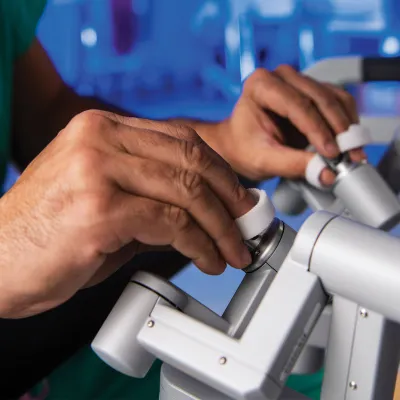
Providing the Right Level of Care for Barrett’s Esophagus
Barrett’s esophagus is a condition closely related to gastroesophageal reflux disease (GERD). It affects about 1 in 10 patients with chronic acid reflux. When the lower part of the esophagus just outside the stomach is regularly exposed to acid reflux, the cells in that area can change. Eventually, they may look like the goblet cells that are found in the small intestine. While Barrett’s esophagus is a non-cancerous disease, patients who have it are at a significantly higher risk for esophageal cancer. Even though most patients with Barrett’s esophagus will not develop esophageal cancer, Barrett’s is considered a precancerous condition.
The gastroenterologists and surgeons at the AdventHealth Digestive Health Institute see many patients with Barrett’s esophagus. Because of the high volume of Barrett’s patients they see, our doctors know how to provide the right level of care for this disease. Some patients find that their Barrett’s esophagus improves when they get their reflux symptoms under control. Others require an endoscopic procedure or, more rarely, surgery to remove the diseased cells from their esophagus. However mild or severe your Barrett’s esophagus is you will find the care you need to gain relief from acid reflux symptoms and reduce your esophageal cancer risk.
Whole-Person Care for Barrett’s Esophagus
By itself, Barrett’s esophagus does not cause symptoms. However, because it is commonly caused by chronic acid reflux, patients with Barrett’s esophagus tend to have symptoms of GERD.
GERD symptoms include:
- Frequent heartburn or chest pain, experienced as a burning pain in the lower part of the middle of the chest and in the mid-abdomen
- Regurgitation
- Dry cough
- Asthma symptoms
- Hoarseness
- A bitter taste in the mouth or back of the throat
- Difficulty swallowing
Certain patients with GERD should be screened for Barrett’s esophagus. Screening is done with an upper endoscopy, where a light and camera are placed on an endoscope down into the esophagus. The endoscope will also remove cells from the esophagus for biopsy. Looking at the genetic makeup of these cells under a microscope can confirm a diagnosis of Barrett’s esophagus.
Screening is usually for patients who have at least two risk factors for Barrett’s esophagus, which include:
- A history of gastroesophageal reflux disease (GERD)
- Being overweight
- Having a hiatal hernia
- Being male
- Being age 50 or older
If you are diagnosed with Barrett’s esophagus, there is a chance that the changed cells in your esophagus could become cancer. Your gastroenterologist may recommend that you have routine screenings for esophageal cancer. These will be done with the same endoscopic procedure used to diagnose Barrett’s esophagus. If you develop esophageal cancer, regular screenings will help ensure that it is caught at an early stage, and will likely make cancer treatment easier and more effective.
What Is the Treatment for Barrett’s Esophagus?
The first step in treating Barrett’s esophagus is to get your acid reflux symptoms under control. The AdventHealth Digestive Health Institute doctors focus on treating GERD. Oftentimes, patients find relief from a minimally invasive surgery performed at AdventHealth that cures GERD symptoms. In turn, this lowers their risk for esophageal cancer. For more information on permanent treatments for GERD, see our web page on GERD and Acid Reflux Treatment.
If Barrett’s esophagus is in more advanced stages, treatment for the diseased esophageal lining may be needed.
At AdventHealth Digestive Health Institute, direct treatment for Barrett’s esophagus is usually done in one of three ways:
- Thermal Ablation
-
Thermal ablation is a non-invasive procedure. It involves using an endoscope to directly apply heat generated by radio frequency ablation (RFA) to the diseased area. The heat burns off the Barrett’s cells in the lining of the esophagus.
No incision is required since the physician accesses the area through the esophagus itself. After thermal ablation, patients will need to undergo an anti-reflux operation to prevent the recurrence or progression of Barrett's esophagus.
Benefits of thermal ablation include:
- A shorter recovery time compared to other treatment techniques for Barrett’s esophagus
- No surgical incisions because the doctor uses an endoscope that is inserted through the mouth and down into the affected area of the esophagus
- No need for hospitalization because thermal ablation is an outpatient procedure
- Endoscopic Mucosal Resection (EMR)
-
EMR is another endoscopic procedure used to treat Barrett’s esophagus. Through the endoscope, the doctor is able to use instruments that cut away the diseased lining of the esophagus. Unlike thermal ablation which does not involve incisions, with EMR the doctor has to make internal incisions to cut out tissue. However, this treatment does not involve external incisions, which means recovery time is relatively short. As with thermal ablation, to prevent the recurrence or progression of Barrett's esophagus, patients will require an anti-reflux operation after EMR.
- Robotic Transhiatal Esophagectomy
-
In some cases, when Barrett’s esophagus progresses to esophageal cancer, treatment by removing part of the esophagus may be in order. While esophagectomy is a major operation, the AdventHealth Digestive Health Institute surgeon Dr. Sharona Ross is experienced in offering it in minimally invasive ways. Minimally invasive esophagectomy, or robotic transhiatal esophagectomy, results in smaller external scars and faster recoveries.
Conditions and Treatments
-
Achalasia
The experienced surgeons at AdventHealth Digestive Health Institute offer effective and permanent treatment for achalasia. Learn more about these treatment options.
-
Acid Reflux/GERD
AdventHealth Digestive Health Institute is a regional top provider of care for acid reflux: Gastroesophageal reflux disease (GERD) and laryngopharyngeal reflux.
-
Barrett's Esophagus
The gastroenterologists and surgeons at AdventHealth Digestive Health Institute provide leading-edge treatment for Barrett’s esophagus. Learn more today.
-
Esophageal Cancer
Typically esophageal cancer requires surgery in addition to radiation and chemotherapy. Learn more about the surgical treatments our specialists can provide.
-
Esophageal Surgery
At AdventHealth Digestive Health Institute, we offer minimally invasive, robotic esophageal surgery as a cancer treatment option.
-
Swallowing Disorders
Our board-certified speech pathologist can assist patients with swallowing disorders and voice issues.
-
Upper Endoscopy / Esophagogastroduodenoscopy (EGD)
An upper endoscopy helps doctors look at the esophagus, stomach and first part of the small intestine and can help diagnose a range of conditions.

Recover Faster With Minimally Invasive and Robotic Surgery
The expert surgeons at the AdventHealth Digestive Health Institute have a large depth of experience in offering minimally invasive surgery.

Meet Your Dedicated Experts
Our specialists are passionate about providing collaborative care that addresses your unique needs and goals while ensuring you feel informed and supported every step of the way. Learn more about our team and their areas of expertise.

Surgical Consultations For Digestive Cancer Without the Wait
Appointments Within Seven Days for Patients with Cancer
At AdventHealth Digestive Health Institute, we know that after being diagnosed with cancer, patients want and often need to begin treatment quickly. So we make it a priority to offer appointments for cancer surgery consultations within five business days, and often earlier.
Patients who are newly diagnosed with cancer, or have just found out they have cancer again, qualify for this priority access. Our surgeons will make themselves available to see you right away, even for a second opinion. We want to help you start your treatment as soon as possible.
Let Us Help You Feel Whole Again
Whether you’re experiencing new symptoms or want a second opinion on a diagnosis, our dedicated digestive health experts are here to help you find answers and a path forward. Request an appointment today to take charge of your health and get the personal support you need.
